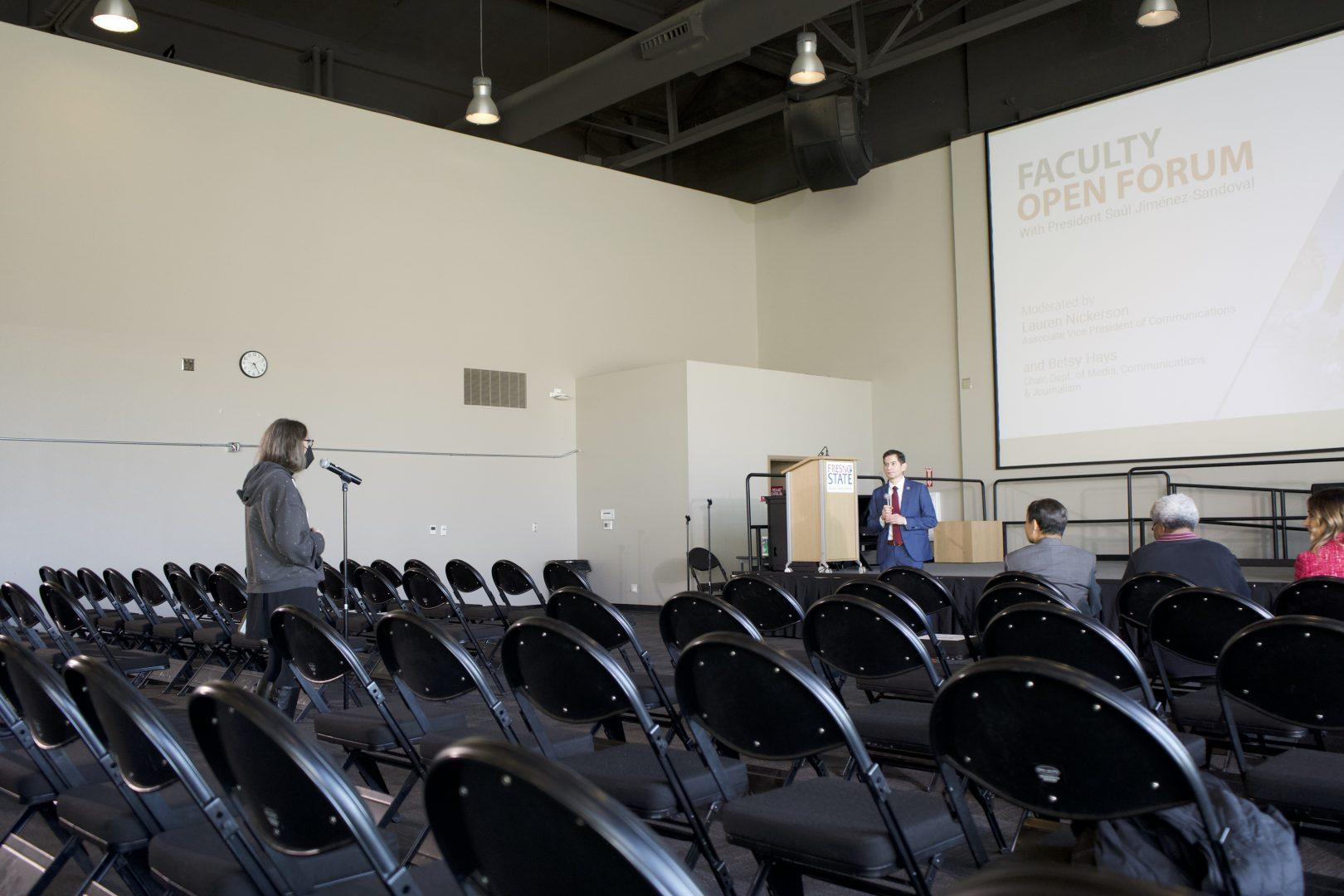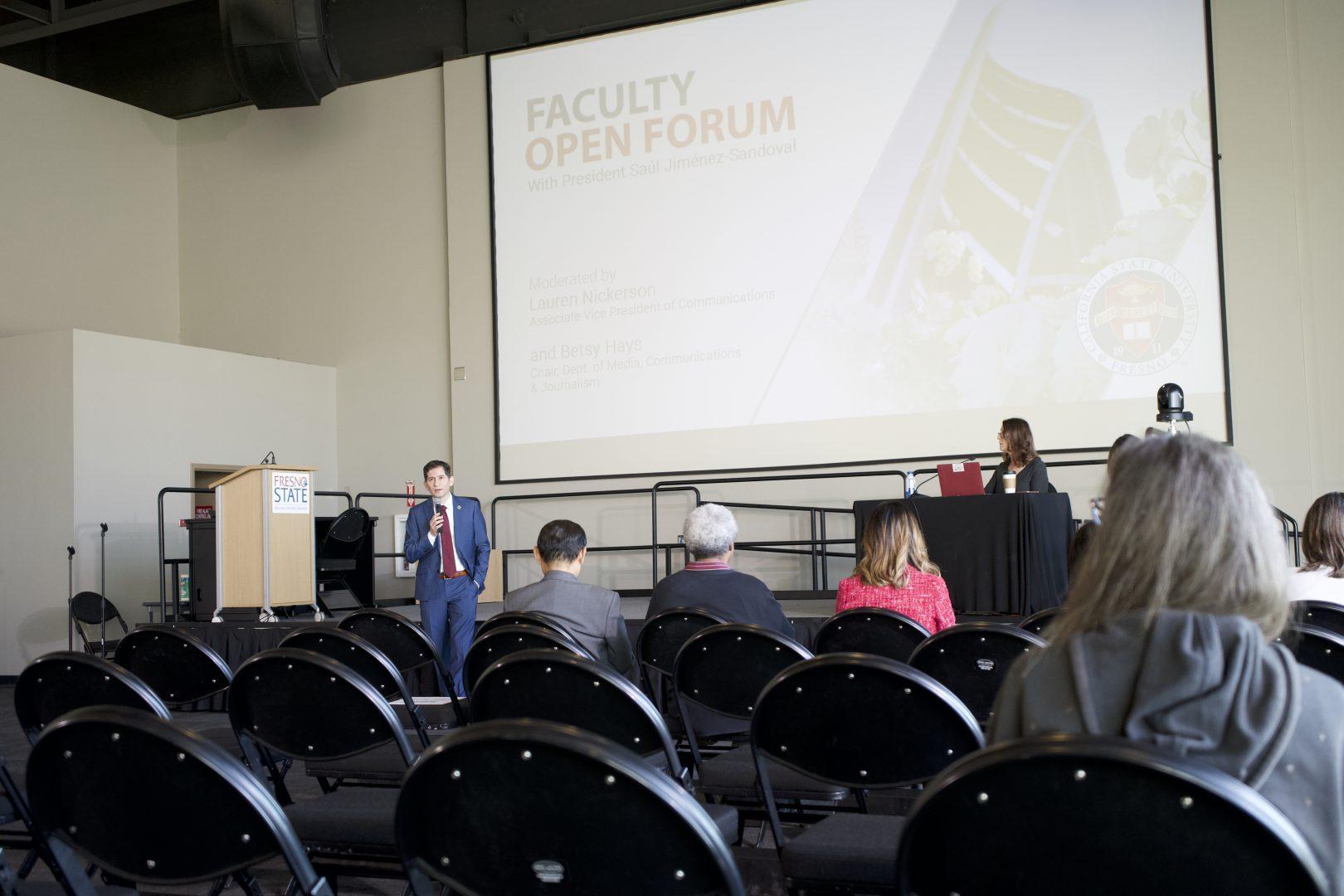On Thursday, Fresno State hosted two hour-long open forums for faculty and staff, discussing any questions, topics or concerns they wanted to share with President Saúl Jiménez-Sandoval and members of administration.
The hybrid event was moderated by Lauren Nickerson, vice president for university communications, and Betsy Hays, chair of the Media, Communications and Journalism department, in Room 118 of the North Gym. Questions were asked in-person and online.
Conversations about Joseph Castro and Frank Lamas
Questions in both forums focused on former Fresno State president Joseph Castro and his handling of sexual harassment cases involving former Fresno State administrator Frank Lamas.
“I do believe that we need to go through the process of saying what happened. We also need to go through the process of envisioning what will happen after this process,” Jiménez-Sandoval said in his opening remarks.
“I know it’s been difficult for many of you. It’s been difficult for me as well as the president, and it’s been difficult for the [Fresno State] region as well. This is something very personal,” he said.
One faculty member, Luz Gonzalez, executive director of the Fresno State Visalia Campus, addressed the importance of protecting women in the campus community, advocating for female faculty members who are afraid of reporting sexual harassment.
The professor said the Castro and Lamas case showcased how the Fresno State environment left female faculty unable to help and frightened to file a complaint because of the “relationship between two men.”
The president agreed with her and said he built his cabinet to promote trust and communication.
“I want to know the truth,” Jiménez-Sandoval said in his response. “I don’t want it sugar coated. I don’t want it to be yielded.”
In the staff meeting, held later, questions were raised if current administrators involved in the case would go on paid leave as investigations continue.
Jiménez-Sandoval stood behind his current administrative staff and said he believes no administrator would go on paid leave.
“They did what they had to do within their own situations,” he said.
He noted that after reading all the documentation of the case, he understood the “pressure on the campus” and that it is “not an easy situation.”
Jiménez-Sandoval shared a brief timeline of his experiencs during the Lamas and Castro situation, and said he did not read all the documentation of the case until he was announced as full-time university president.
When Jiménez-Sandoval became provost and vice president of academic affairs in 2019, he said he had interacted with Lamas in a span of a couple of months until an email informed him that Lamas was taking a “leave of absence.”
He then reached out to Lamas and told him to get well because he assumed he left due to an illness.
In January 2020, Jiménez-Sandoval said he started to hear things about possible investigations and thought he’d be notified by Castro once a report was released. Once a report was produced in March 2020, Jiménez-Sandoval said it wasn’t shared until the following month.
During negotiations that resulted in Lamas’ removal from Fresno State, Jiménez-Sandoval said he was only part of the settlement when Castro asked if Lamas could return as a teacher for the Kremen School of Education. Jiménez-Sandoval said he rejected the proposal.
He also noted that he did not know about the $260,000 in the settlement and when issues of personal matters involve one cabinet member, the others don’t know due to confidentiality.
“What is important to know is the problem: We don’t do anything independently from the system. Everything that Fresno State does here goes in direct coordination with the system; with the Office of General Counsel,” Jiménez-Sandoval said.
Since Jiménez-Sandoval took over as full-time president in January 2021, he said he wanted to make it clear to faculty and staff who were hurt and angry with Castro’s mishandling that he understands the situation after reading all the reports.
“You need to trust me, and you need to trust that I have read everything that has come to my desk,” Jiménez-Sandoval said. “I have seen the documentation and I trust my cabinet fully and completely.”
Updates and community concerns regarding Title IX
Conversations about Castro led to a broader discussion about the university’s treatment of all Title IX cases, with both staff and faculty advocating change in the system and process of how the Fresno State community handles these cases

The university president provided updates on the Title IX task force that was announced on Feb. 8 and said he is waiting on confirmation of four more members of the committee to reveal the full task force. It was also announced that members will consist of professors, staff members and three students, as well as community members and professionals outside of Fresno State.
He also specified that the purpose of the task force is to investigate Title IX cases, discrimination, harassment and retaliation (DHR), alongside microaggression and macroaggression, which make up 85% of cases the administration receives, Jiménez-Sandoval said.
He noted that the classification of a microaggression can also involve cases that are not accepted for investigation,and that the task force was made to also assess this “gray area” in Title IX and DHR cases.
“We need a system that really addresses these [issues]. Something concrete in which we have everyone on board, from our deans, to the cabinet members, to the chairs, to everyone working together for a space that’s collaborative and that is open to communication,” he said.
Along with the task force, questions were brought up about the three additional administrators for Title IX and DHR that Jiménez-Sandoval announced he’d hire, with one comment questioning why the university doesn’t invest more resources and funds to the current staff.
The three additions to the staff were created to promote a more efficient system, according to Jiménez-Sandoval. He said he wants the system to have students’ voices heard, come up with a solution or at least inform them where they are in the process of their case.
Title IX concerns involving the LGBTQ+ community were brought up in the faculty forum. The president said he has talked with advocacy groups who want the Student Health Center to start providing health initiatives and services to those communities.
COVID-19, mask policy and virtual synchronous courses
The president said he wanted to make it clear that Fresno State is “still dealing with COVID-19.”
Vice President Deborah Adishian-Astone said the university still encourages everyone to complete the survey before going on campus, and said that the COVID-19 Testing Center will continue to be open the remainder of this semester.
In response to questions about the university lifting its mask policy, Jiménez-Sandoval said the university is still confident with its decision and stands behind the decision to let only faculty, not staff, enforce a mask requirement because of some classroom environments that prefer masks.
Faculty and staff also brought up the student rating system for professors, saying they noticed students struggling to fight complaints they made to administration.
Many said that students’ complaints aren’t being heard and advocated for changes in how professors teach, with Carlos Martinez, professor of the Craig School of Business, saying, “when students are paying, they deserve good treatment, good customer service.”
“We have confidentiality concerns and the regulations are part of collective bargaining agreement,” Interim Provost and Vice President for Academic Affairs Xuanning Fu said. “We want to significantly improve student feedback. We’ve been working really hard to encourage it.”
Fu noted that student participation in the rating systems has declined since the beginning of COVID-19.
The president also responded and said that Department Chair of Child and Family Science Kathleen Dyer is spearheading a new way of assessing professors in class, and that more information will be announced at a later time.
Both staff and faculty also posed questions about virtual synchronous learning and telecommuting with students.
Jiménez-Sandoval said virtual synchronous classes will continue for classes that are more suitable for a virtual platform than in-person.
The staff forum brought up a “sense of frustration,” Hays said, reading one comment online, because certain staff members are accepted for telecommuting while others are denied due to “essential nature of their work.”
The president said that the university is doing its best to accommodate those still wanting to conduct work virtually and that people with specific cases or complaints should contact him.





